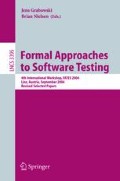Abstract
This paper presents a method for reducing the cost of test generation. A spanning set for a coverage criterion is a set of entities such that exercising every entity in the spanning set guarantees exercising every entity defined by the coverage criterion. The central notion used in constructing a minimum spanning set is subsumption relation. An entity subsumes another entity if exercising the former guarantees exercising the latter. We develop a method for finding subsumption relations which can be uniformly applied to a family of control flow and data flow oriented coverage criteria by reducing the problem of determining whether an entity subsumes another entity to the model checking problem of the linear temporal logic LTL.
Access this chapter
Tax calculation will be finalised at checkout
Purchases are for personal use only
Preview
Unable to display preview. Download preview PDF.
References
Agrawal, H.: Dominators, Super Blocks, and Program Coverage. In: Proc. of the 21st ACM Symposium on Principles of Programming Languages, pp. 25–34 (1994)
Aho, A.V., Sethi, R., Ullman, J.D.: Compilers, Principles, Techniques, and Tools. Addison Wesley, Reading (1986)
Bertolino, A.: Unconstrained Edges and Their Application to Branch Analysis and Testing of Programs. The Journal of Systems and Software 20(2), 125–133 (1993)
Bertolino, A., Marré, M.: Automatic Generation of Path Covers Based on the Control Flow Analysis of Computer Programs. IEEE Transactions on Software Engineering 20(12), 885–899 (1994)
Bertolino, A., Marré, M.: How Many Paths are Needed for Branch Testing? The Journal of Systems and Software 35(2), 95–106 (1996)
Chusho, T.: Test Data Selection and Quality Estimation Based on the Concept of Essential Branches for Path Testing. IEEE Transactions on Software Engineering 13(5), 509–517 (1987)
Dssouli, R., Saleh, K., Aboulhamid, E., En-Nouaary, A., Bourhfir, C.: Test Development for Communication Protocols: towards Automation. Computer Networks 31(7), 1835–1872 (1999)
Gupta, R., Soffa, M.L.: Employing Static Information in the Generation of Test Cases. Software Testing, Verification and Reliability 3(1), 29–48 (1993)
Hong, H.S., Lee, I., Sokolsky, O., Ural, H.: A Temporal Logic Based Theory of Test Coverage and Generation. In: Katoen, J.-P., Stevens, P. (eds.) TACAS 2002. LNCS, vol. 2280, pp. 327–341. Springer, Heidelberg (2002)
Hong, H.S., Cha, S.D., Lee, I., Sokolsky, O., Ural, H.: Data Flow Testing as Model Checking. In: Proc. of the 25th International Conference on Software Engineering, pp. 232–242 (2003)
Laski, J.W., Korel, B.: A Data Flow Oriented Program Testing Strategy. IEEE Transactions on Software Engineering 9(5), 347–354 (1983)
Manna, Z., Pnueli, A.: The Temporal Logic of Reactive and Concurrent Systems: Specification. Springer, Heidelberg (1992)
Marré, M., Bertolino, A.: Unconstrained Duas and Their Use in Achieving All-uses Coverage. In: Proc. of the International Symposium on Software Testing and Analysis, pp. 147–157 (1996)
Marré, M., Bertolino, A.: Reducing and Estimating the Cost of Test Coverage Criteria. In: Proc. of the 18th International Conference on Software Engineering, pp. 486–494 (1996)
Ntafos, S.C.: On Required Element Testing. IEEE Transactions on Software Engineering 10(11), 795–803 (1984)
Rapps, S., Weyuker, E.J.: Selecting Software Test Data Using Data Flow Information. IEEE Transactions on Software Engineering 11(4), 367–375 (1985)
Tasiran, S., Keutzer, K.: Coverage Metrics for Functional Validation of Hardware Designs. IEEE Design and Test of Computers 18(4), 36–45 (2001)
Ural, H., Yang, B.: A Test Sequence Generation Method for Protocol Testing. IEEE Transactions on Communications 39(4), 514–523 (1991)
Ural, H., Saleh, K., Williams, A.: Test Generation Based on Control and Data Dependencies within System Specifications in SDL. Computer Communications 23(7), 609–627 (2000)
Zhu, H., Hall, P.A., May, J.H.R.: Software Unit Test Coverage and Adequacy. ACM Computing Surveys 29(4), 366–427 (1997)
Author information
Authors and Affiliations
Editor information
Editors and Affiliations
Rights and permissions
Copyright information
© 2005 IFIP International Federation for Information Processing
About this paper
Cite this paper
Hong, H.S., Ural, H. (2005). Using Model Checking for Reducing the Cost of Test Generation. In: Grabowski, J., Nielsen, B. (eds) Formal Approaches to Software Testing. FATES 2004. Lecture Notes in Computer Science, vol 3395. Springer, Berlin, Heidelberg. https://doi.org/10.1007/978-3-540-31848-4_8
Download citation
DOI: https://doi.org/10.1007/978-3-540-31848-4_8
Publisher Name: Springer, Berlin, Heidelberg
Print ISBN: 978-3-540-25109-5
Online ISBN: 978-3-540-31848-4
eBook Packages: Computer ScienceComputer Science (R0)

